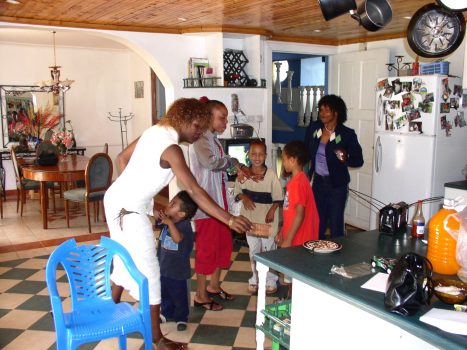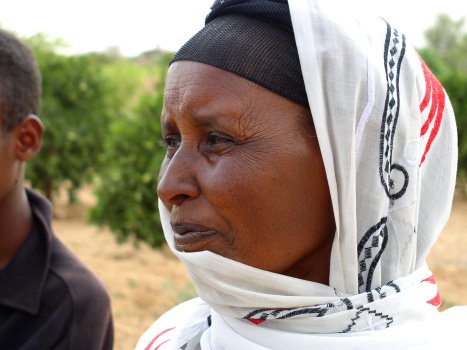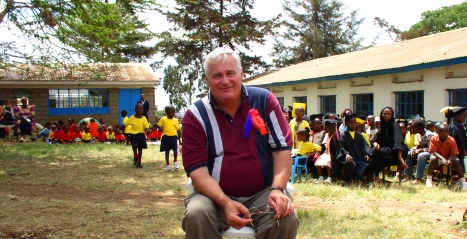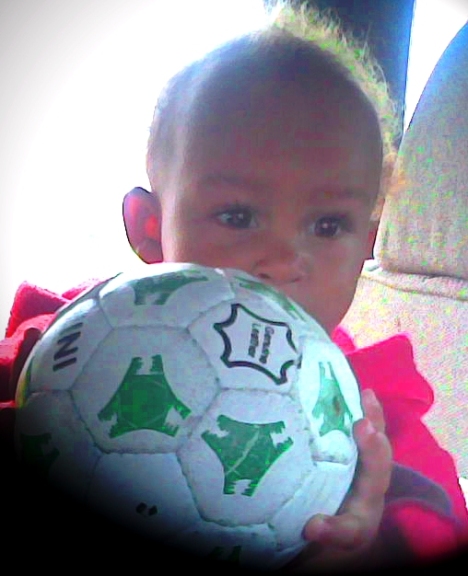 Margaret: “I am a Malaya.”
Margaret: “I am a Malaya.”
Christina: “I am just a Prostitute”
Just Two of the Angels
I woke this morning in a gorgeous venue, a house full of lovely children, lovely mothers. Half a dozen brown kids busy in the kitchen, busy on the patio, pitching in: What are you doing? We are playing. Karate kicking 5 year olds, pratfalling, somersaulting, dancing up and down steep stairs like mountain goats, light, beyond gravity. Make believing, asking questions, doing favors, feeling good. Healthy, healing.
Teenagers making coffee and toast and soft boiled eggs for me, pre-teens, the middle ones, looking after the younger ones, the mothers supervising activities and tending to the laundry, cleaning floors, drying wet clothes up on the line, youngsters doing homework at the picnic table: Everyone but me, very busy. Even the gardener is moving around the place, transporting stones by wheel barrow below, washing the car, tidying the hedges by the bean field, anticipating the chicken houses and day old chicks to come in January.
The mothers and I are recovering from Nairobi Night Club After-Burn, a common local disease, not just on weekends, the effect of furious expression, focused presentation dancing, shooting 8-ball, chatting up locals, measuring tourists, regulars, newcomers, kicking Friday night into Saturday morning, putting on the dog, giving it all away, surging sweat into the Nairobi night, in tune, on time to the music, one place live, one place studio blare, mechanical down-beat techno-disco, Kenya 2K tradition. Mindless reveling, born in stuffy Gigiri bureaucracies and foreign bush posts and remote humanitarian projects or displaced persons’ camps, exiles from The West in the Nairobi night, System Geeks getting what they think they need. The vamps and vampires wait on the barstools for the money to flow. The Angels sit there, too.
I see myself through the window, a bright bird diving into the greenery, coming out the other side, going into a luscious shrub flashing black and scarlet, sweet, coming out the other side of time, banana yellow on shiny coal. I know illusion. Where is that magician now? I want to see beyond that hedge. I plunge through the bush. I want to know the other side of the garden. I will climb there. I will look back down on the world from the aromas of the herbs and bean and potato patch.
Seven kids, three mothers, angels of mercy, angels of charity, jamming vamps, practiced international models, starlets in the Nairobi night, the best of the best, sages in see-through, virtue costumed in vice. Four fathers not around, maybe in Somalia, maybe in Sudan, maybe in UK, or USA, or Germany or Italy. International fathers, left the seed here, Nairobi mothers tending crop. Survivors in Hell, transforming battle scars to a Heaven of security, disciplined service to the in-group of sisters, natural community, common language, Kuja Hapa Mama, insist the kids have formal education, formulas cover the wall of the study room, areas of triangles, diagrams of flower parts, unconditional love and comfort, keep the young ones innocent, at least for another day. Angels of goodness, clean hearts pouring bizarre and tawdry stories into the cup like sweet white coffee, tales with heart, randy, crazy, insane, cinema verite, laughing at the Devil, tempting fate in the Nairobbery street, albeit the upscale side: believers in God, but not in men or law. I am also a father not around. In Kenya, one says, “I am paining.” And I am paining, too.
Somehow the mothers get what they need, each one differently, they give to each other out of love and faith, the sisterhood of mothers. The Head Angel has no fear. She built a fifteen room retreat far, but not too far, from the glitter, cheap make-up city-action, in the hills, half an hour from town, high, highrayyyy Bob Marley sings, music above, noise below. It is substantial, the work and planning. Even from the gate at the road connecting the estate, one senses quality, a sense of purpose, the money has been well spent, the project is not finished. Who knows and who cares how many sources she was to find, how many ups and downs she was to integrate, how many disappointments she was to mix into the present state of affairs? She looks ahead, ignores the madness behind. She dresses her scars with a burst of laughter, the optimistic remark. Her wings spread over a home, a project, no negativity allowed. That is her coping state.
I browsed her bookcase at noon. I found Michael Ondaatje, The Collected works of Billy the Kid and The Cinnamon Peeler. How did these treasures find a country home on the border of the Masai bush with Cityness in Kenya? Were they left by a former husband or boyfriend or visitor, a drunken Irish overlander, a friend of a friend? I asked, of course, where they came from. She found them herself by instinct in a second hand book section in town, by reading a bit, a sample, by examining the look and feel. How intuitive she is, how accurate the quality of her hunches. I re-read much of Billy, I read half of Cinnamon. I went to the patio and had my coffee, sugared and stirred by 2 year old Jonathan, I read some more from Ondaatje. He speaks of scars, I go slowly through it, I have been thinking of scars quite a lot lately.
We remember the time around scars,
They freeze irrelevant emotions
And divide us from present friends.
I remember this girl’s face,
The widening rise of surprise.
And later in the poem, I am tearing by now, stone quiet, I again flash to the impact that Ondaatje has on me, directly, indirectly, how Peggy wrote of him, how she, a wonderful poet in her own right, gave me Billy The Kid, how I have it stored neatly in my mother’s place in Cowpens, South Carolina, I could put my hand on it in the dark, how the scars do “freeze irrelevant emotions.” I am a father not around. In any event he concludes:
I would meet you now
And I would wish this scar
To have been given with
All the love
That never occurred between us.
So he triggers me into the world of scars and emotions once again. Maybe we are all Billy The Kid somehow, the Queens of Vamp in Nairobi, the soldiers of humanitarian despair in the boonies of Sudan and Somalia and Afghanistan and Bolivia and Zimbabwe and Atlanta ad nauseum. When Billy is described as “not all good and not all bad” by Sally Chisum, she is painting the human condition, not Billy. There is an Angel in every Devil. There is a redeeming feature in the air. And hope is in the kids, no? Please don’t mar them scar them, it isn’t necessary; they face their traumas eventually, we must give them a proper state of mind to do so.
I read for three hours on the flight yesterday to Nairobi the autobiography of Waris Darie, the nomad girl turned international fashion model. Her story is woven like a reed milk jug around her childhood trauma, FGM. My mind was on trauma even the days before, I had just distributed to a woman’s health group in Hargeisa some unpublished notes of Dr. Paul Michael Schlosser on Triggers and Post Traumatic Stress Disorder, the scars left by trauma, the states of mind that allow us to cope with the scars, but not necessarily in the healthiest ways, how to take the negative charge out of the trauma, how we must learn to help each other through these triggered states that are formed by the trauma.
Scars. PTSD. The States of Mind that Angels must return to when they look for money in Nairobi. They are scarred and triggered. The States of Mind the Somali and other women carry for life because of their childhood circumcisions. They are scarred and triggered. The States of Mind we go to when we are here and hear that teacher’s voice from the past, a false accusation, a hurtful lie, or the policeman’s siren coming louder, when we see the closed fist of a bully. The common laws of psychology we share.
So it is all convening in a flood on the patio. I sip my white coffee. The essential Somali scar, the Nairobi night-heat, the fathers not around. FGM links Waris to Schlosser to me. Now Ondatjee and Angels Annie and Christine and Maggie close a circle, put a roof on it, shelter us for now. The scars are there in all their beauty. No charge. The traumas are beneath the surface. No charge. The collective survival techniques and unconditional love tie us together. Panaceas, Universals we must remember.
I plunge again, I take Ondaatje to the most rear garden, up the hill behind the hedge, into the herbs, the beans and maize, above the house and flower garden. I feel he has been there, too. Two pre-teens follow me, then take the lead to the highest view of the valley. I look back down and know there is hope. Good luck and good intention. Couple of kids in the garden looking down, too, quiet and peaceful. My Twenty four hoursback in Nairobi are up. Amen.
Copyright 2009 Jim Shanor
Filed under: Culture, East Africa, FGM, Kenya, Scars | 2 Comments »







 Jim Shanor Kibera Grad Day
Jim Shanor Kibera Grad Day Margaret: “I am a Malaya.”
Margaret: “I am a Malaya.”  How am I doing, How do you do?
How am I doing, How do you do? Don’t remember the first ball in my life. Soft ball? Tennis ball? Ping Pong? It was likely a ball of yarn. My mother Ruth used to knit household items, make mittens, sweaters, and baby clothes, fix collars, make doilies, mend things. Most mothers of war babies knew how to do that. We were pre-automatic washers, before the tags on our cotton-rayon shirts said Made in Pakistan or Hecho en Mexico. Mothers in many parts of the world today still knit and darn and weave and crochet. So there are modern boys and girls rolling the balls of yarn around the carpet, dropping them off chairs, tugging on them with the cat. Learning how the spheroids work in nature. A ball can be a great teacher.
Don’t remember the first ball in my life. Soft ball? Tennis ball? Ping Pong? It was likely a ball of yarn. My mother Ruth used to knit household items, make mittens, sweaters, and baby clothes, fix collars, make doilies, mend things. Most mothers of war babies knew how to do that. We were pre-automatic washers, before the tags on our cotton-rayon shirts said Made in Pakistan or Hecho en Mexico. Mothers in many parts of the world today still knit and darn and weave and crochet. So there are modern boys and girls rolling the balls of yarn around the carpet, dropping them off chairs, tugging on them with the cat. Learning how the spheroids work in nature. A ball can be a great teacher.